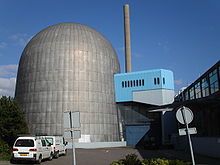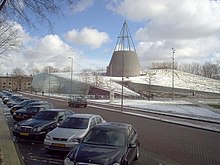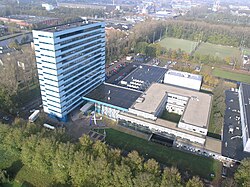Delft University of Technology
| Delft University of Technology | |
|---|---|

|
|
| founding | January 8, 1842 |
| place | Delft , Netherlands |
| Rector | Tim van der Hagen |
| Students | 23,461 (2017) |
| Employee | 5189 (2017) |
| including professors | 253 (2017) |
| Annual budget | € 857.3 million |
| Networks | IDEA League , CESAER , UNITECH |
| Website | www.tudelft.nl |

As 1842 Royal Delft Polytechnic , founded Technical University of Delft ( Dutch Delft University of Technology ; 1905-1986 Technische Hogeschool van Delft ) in Delft is the oldest University of the Netherlands .
Around 3,100 academic employees, including 253 professors, work at the university and more than 23,000 students study, almost 20 percent of whom come from abroad. What is striking about these numbers (but typical for a technical university) is the unequal gender ratio: around 27 percent of students and around 25 percent of academic staff are women; in the case of non-academic staff, this proportion is only slightly less than half. The university is divided into eight faculties, one of which is partly operated jointly with the University of Leiden . The TU Delft is one of the most renowned universities in the Netherlands and is a member of the European university association IDEA League . In the QS World University Rankings 2019, the university ranks 52nd in a global comparison, while it ranks 22nd in the field of engineering and third in the field of architecture.
Faculties
The university consists of a total of eight faculties :
- Faculty of Architecture
- Faculty of Civil Engineering and Geosciences
- Faculty of Electrical Engineering, Mathematics and Computer Science
- Faculty of Industrial Design
- Faculty of Aerospace Engineering
- Faculty of Mechanical Engineering, Marine Technology and Materials Science
- Faculty of Technology, Politics and Management
- Faculty of Technical Sciences
The university's Delft Center for Entrepreneurship trains innovative entrepreneurs and incubates start-ups.
The building of the Faculty of Architecture was completely destroyed by fire on the morning of May 13, 2008 after a short circuit in a coffee machine. The Minister for Education, Culture and Science Ronald Plasterk described the fire as "the greatest disaster that universities in the Netherlands have ever experienced"
Faculty of Aerospace Engineering
The Faculty of Aerospace Engineering at TU Delft in the Netherlands combines the two worlds of aerospace and space in one degree. The aeronautical part of the course deals with the technology in and around aircraft and the space part of the course deals with rockets and satellites . Both parts are dealt with in detail at the faculty.
General information about the Faculty of Aerospace Technology
The faculty is one of the largest faculties at the TU Delft and one of the largest faculties in north-western Europe , dealing exclusively with aerospace engineering. It is also the only institute in the Netherlands that conducts research and education in aerospace engineering. Today, the Faculty has about 2,300 Bachelor - and Master - students , 237 academic staff and 181 doctoral students. About a third of the students studying in the faculty are international students.
research
The faculty is currently doing research in the following areas: novel materials, particle image velocimetry , the CubeSat and many others. The ten chairs are part of the following four different areas:
- Aerodynamics, wind energy, flight performance and propulsion (AWEP)
- Control and operation (C&O)
- Lightweight construction and materials (ASM)
- Space (SpE)
Furnishing
Extensive laboratories and test facilities are used for research and teaching. The faculty has wind tunnels for super- , hypersonic and subsonic speeds , a highly sensitive navigation simulator and a material test laboratory. This equipment enables the faculty to carry out experiments in the areas of human-machine interaction, air traffic control , lightweight construction , materials, aerodynamics , simulation and navigation . The faculty owns and uses a Cessna Citation - jet aircraft as a flying classroom. The citation is used for research and teaching. Since the interior of the aircraft can be changed, one can easily switch from a research configuration to a teaching configuration for students. The Simona, the flight simulator, is one of the most unique pieces of equipment in the aerospace engineering faculty. The simulator can be programmed to simulate any aircraft, but also to mimic new characteristics from new designs. This allows the behavior of the aircraft to be simulated extremely realistically. The simulator is used for research and also for master's theses.
National and international cooperation
The faculty is a member of the Partnership of a European Group of Aeronautics and Space Universities , the European network of aerospace technology universities. She also takes part in the Erasmus program and the IDEA League , a merger with the universities of ETH Zurich , RWTH Aachen and Chalmers University .
D: Dream student teams
TU Delft receives special attention from its numerous student teams, who regularly achieve top placements in international technology competitions. So that won Hyperloop team in 2017 the main prize of by Elon Musk proclaimed SpaceX Hyperloop Pod Competition in California, even if the team of Technical University of Munich reached a higher speed. At the World Solar Challenge , which takes place every two years in Australia , the Delft team has won the race in the Challenger class seven times with its solar vehicle since 2001 and also holds the course record. Other teams are developing, among other things, a solar boat , a hydrogen-powered car and an exoskeleton for people with disabilities. The university is currently providing workshop space in the so-called D: Dream Hall to the 13 teams .
Ranking
The TU Delft has steadily improved in the international QS World University Ranking since 2010. At that time it was still in 108th place, in 2019 it reached 52nd place in the overall ranking. Looking only at the Engineering and Technology category , the university has been relatively stable between 15th and 20th place for years; In 2018 she reached 22nd place in this category. That makes it the best university in the Netherlands in this ranking. In the ranking of the Times Higher Education , the TU Delft reached the 58th place in 2019 and was therefore on a par with the University of Wageningen, also in the Netherlands . In the Shanghai ranking , the TU Delft is between ranks 150 and 200 and was therefore only the ninth-best university in the country in 2018.
Honorary doctors
- Abraham Kuyper (1907)
- Cornelis Lely (1907)
- Petrus Cuypers (1907)
- Gerard LF Philips (1917)
- Hendrik Antoon Lorentz (1918)
- Hendrik P. Berlage (1925)
- Albert Plesman (1947)
- ZKH Prins Bernhard (1951)
- John Douglas Cockcroft (1959)
- Gerrit Th. Rietveld (1964)
- Santiago Calatrava (1997)
Students and Professors (selection)
Architecture / art studies
- Han van Meegeren (1889–1947), Dutch painter and art forger
- Johannes Hendrik van den Broek (1898–1978), Dutch architect
- Dirk Bolt (* 1930), architect and urban planner
- Alexander Tzonis (* 1937), Greek architecture critic
Technology / natural sciences / mathematics
- Louis Aronstein (1841–1913), German chemist
- Martinus W. Beijerinck (1851-1931), Dutch microbiologist
- Johannes Martinus Burgers (1895–1981), Dutch physicist
- Dirk Coster (1889–1950), Dutch physicist
- Cees Dekker (* 1959), Dutch physicist
- Jacobus Henricus van 't Hoff (1852–1911), Dutch chemist
- Alexandre Horowitz
- Ralph E. Kleinman (1929–1998), American mathematician
- Warner T. Koiter (1914–1997), Dutch mechanic
- René de Borst (* 1958), Dutch mechanic
- Leo P. Kouwenhoven (* 1963), Dutch physicist
- Simon van der Meer (1925–2011), Dutch physicist
- Walter Lewin (* 1936), Dutch physicist
- Felix Andries Vening-Meinesz (1887–1966), Dutch geophysicist
- Willem van der Poel
- Bernard Tellegen (1900–1990), Dutch electrical engineer
- Johan van Veen
Politics / Economics
- Jan van Bemmel (* 1938), Dutch computer scientist
- Wim Dik
- Karien van Gennip
- Pieter Hofstra
- Frederik Bernard s'Jacob
- Abdul Kadir Khan (* 1936), Pakistani engineer
- Anton Mussert (1894–1946), Dutch civil engineer
- Cornelis Lely (1854–1929), Dutch hydraulic engineer
- Johan Friso of Orange-Nassau (1968-2013)
- Gerard Philips (1858–1942), Dutch entrepreneur
- Frits Philips (1905-2005), Dutch industrialist
- Jo Ritzen (* 1945), Dutch economist
- Diederik Samsom
- Willem Schermerhorn (1894–1977), Dutch cartographer and politician
- Egbert Schuurman
- Henk Slebos
- Paul Smits
- Jeroen van der Veer (* 1947), Dutch manager
- Bas van der Vlies
- Frits Fentener van Vlissingen
University partnerships
The Technical University of Delft has partnerships with the following European universities, among others:
- Rheinisch-Westfälische Technische Hochschule Aachen
- Technical University Berlin
- Wroclaw University of Technology
- University of Exeter
- Technological University Bergakademie Freiburg
- Helsinki University of Technology
- Technical University of Košice
- Imperial College London
- University of Miskolc
- ETH Zurich
TU Delft is also a founding member of the Open Education Consortium , many courses are online as OpenCourseWare .
See also
Web links
Individual evidence
- ↑ Prof. dr.ir. Tim van der Hagen. TU Delft, accessed on January 24, 2019 (English).
- ↑ a b c Student Population. TU Delft, accessed on January 24, 2019 (English).
- ↑ a b c d Staff. TU Delft, accessed on January 24, 2019 (English).
- ↑ a b QS World University Ranking 2019. QS World University Ranking, accessed on January 24, 2019 (English).
- ↑ Archived copy ( Memento of the original from March 4, 2014 in the Internet Archive ) Info: The archive link was inserted automatically and has not yet been checked. Please check the original and archive link according to the instructions and then remove this notice.
- ^ Anne Huschka: Short circuit in coffee machine - Faculty burns down , in: Spiegel Online , May 16, 2008
- ↑ a b Feiten en Cijfers . Delft University of Technology. Retrieved January 15, 2014.
- ^ Departments and Chairs . Delft University of Technology. Retrieved January 15, 2014.
- ↑ Facilities . Delft University of Technology. Retrieved January 15, 2014.
- ↑ SpaceX competition: Munich has the fastest Hyperloop capsule. wired.de, January 30, 2017, accessed on January 24, 2019 .
- ↑ Honor Roll. World Solar Challenge, accessed January 24, 2019 .
- ↑ D: Dream. TU Delft, accessed January 24, 2019 (Dutch).
- ↑ Rankings. TU Delft, accessed on January 24, 2019 (English).
- ↑ World University Rankings 2019. Times Higher Education, accessed January 24, 2019 .
- ↑ ARWU World University Rankings 2018. Shanghai Ranking Consultancy, accessed on January 24, 2019 .




